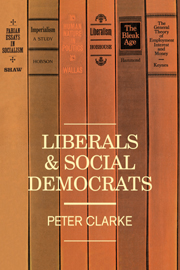Book contents
- Frontmatter
- Contents
- Preface
- System of references
- Prologue: Original sin and the modern state
- 1 The passion for improving mankind
- 2 Good men fallen among Fabians
- 3 Imperialism
- 4 The State and the Nation
- 5 Human nature in politics
- 6 War
- 7 Hobson's choice
- 8 The bleak age
- Epilogue: Sans everything
- Bibliographical notes
- Appendix
- Index
Prologue: Original sin and the modern state
Published online by Cambridge University Press: 14 January 2010
- Frontmatter
- Contents
- Preface
- System of references
- Prologue: Original sin and the modern state
- 1 The passion for improving mankind
- 2 Good men fallen among Fabians
- 3 Imperialism
- 4 The State and the Nation
- 5 Human nature in politics
- 6 War
- 7 Hobson's choice
- 8 The bleak age
- Epilogue: Sans everything
- Bibliographical notes
- Appendix
- Index
Summary
This book is about the relationship between liberalism and socialism in Britain in the late nineteenth and twentieth centuries. It focuses largely on four intellectuals who were, it is held, both liberals and social democrats – Graham Wallas (1858–1932), L. T. Hobhouse (1864–1929), J. A. Hobson (1858–1940) and J. L. Hammond (1872–1949). Barbara Hammond (1873–1961) is hardly less important. Their lifetimes are the time-span of the book. There are other liberals or socialists – notably, Gilbert Murray, Bernard Shaw, Sidney and Beatrice Webb, R. H. Tawney and J. M. Keynes – who receive considerable attention at points where their activities significantly influenced the story. Its central figures, however, were more closely and continuously linked to each other, in their ideas and in their lives. They were recognised as the core of a definite group of publicists, most of whom were associated with the weekly paper the Nation under the editorship of H. W. Massingham; and they were perhaps its most academically distinguished members. Wallas spoke for all of them when he said he wished to be remembered by his books. Both their moral commitment and their political leverage was expressed in their published work. ‘They went about – or rather they wrote about – redressing human wrongs’, was how one obituary put it.
They could be called bourgeois socialists of the sort Marx and Engels warned against in the Communist Manifesto – ‘economists, philanthropists, humanitarians, improvers of the condition of the working class, organisers of charity, members of societies for the prevention of cruelty to animals, temperance fanatics, hole-and-corner reformers of every possible kind’.
- Type
- Chapter
- Information
- Liberals and Social Democrats , pp. 1 - 8Publisher: Cambridge University PressPrint publication year: 1978



